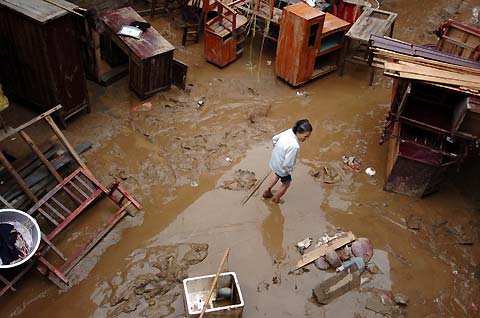Hui calls for flood-control efforts amid Bilis ravage
(Xinhua)
Updated: 2006-07-18 20:02
As the death toll from the rainstorms and floods triggered by the killer
tropical storm Bilis has risen to 198 in China, Vice Premier Hui Liangyu on
Tuesday urged all related government departments to continue their efforts in
flood control and disaster relief.
The Chinese government regards the current flood control task its top
priority and pays great attention to safety of people's life, Hui said during an
inspection tour in Hunan Province, the worst-hit province where 92 people have
been confirmed dead, more than 100 are missing and 400,000 others are affected.
|

A woman walks in the muddy street of Chenzhou
in Central China's Hunan Province after floods brought by typhoon Bilis
fade away in the area on July 17, 2006. [Xinhua]
|
Hui, also head of the State Flood Control and Drought Relief Headquarters,
visited several flood-hit counties and cities, calling for continuous efforts in
flood control, settlement of affected people and rebuilding of destroyed houses.
The vice premier said storm-ravaged areas still face great pressures in flood
control and disaster relief so that governments at all levels must take
effective measures to prevent more possible disasters and ensure safety of major
rivers and reservoirs in the flooding season.
Thanks to the well-prepared emergency plans and the timely instructions from
the State Council, disaster relief in flood-hit areas is being conducted in an
orderly way.
The State Flood Control and Drought Relief Headquarters have sent a dozen of
task forces to check flood prevention and control efforts along major rivers.
Hui, also a member of the Political Bureau of the Communist Party of China
Central Committee, warned local officials of their duty in flood control, asking
them to take measures against possible spread of epidemics in flood-hit areas.
The vice premier also urged local governments to help farmers restart farming
production in disaster-ravaged areas to minimize the damage to crop growth and
harvest.
|